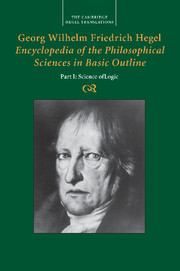 Georg Wilhelm Friedrich Hegel: Encyclopedia of the Philosophical Sciences in Basic Outline
Georg Wilhelm Friedrich Hegel: Encyclopedia of the Philosophical Sciences in Basic Outline Book contents
- Frontmatter
- Contents
- Acknowledgments
- Introduction: Hegel’s Encyclopedia Logic
- Translators’ Note
- Encyclopedia of the Philosophical Sciences in Basic Outline, Part I: Science of Logic
- Part I Science of Logic §§ 19–244
- Bibliography
- Glossary of Translated Terms, German to English
- Glossary of Translated Terms, English to German
- Index
Introduction: Hegel’s Encyclopedia Logic
Published online by Cambridge University Press: 30 September 2021
- Frontmatter
- Contents
- Acknowledgments
- Introduction: Hegel’s Encyclopedia Logic
- Translators’ Note
- Encyclopedia of the Philosophical Sciences in Basic Outline, Part I: Science of Logic
- Part I Science of Logic §§ 19–244
- Bibliography
- Glossary of Translated Terms, German to English
- Glossary of Translated Terms, English to German
- Index
Summary
Georg Friedrich Wilhelm Hegel (1770–1831) is one of the great figures of German Idealism along with Immanuel Kant (1724–1804), JohannGottlieb Fichte (1762–1814) and Friedrich Wilhelm Joseph Schelling (1775–1854). Hegel's most famous publication is undoubtedly the Phenomenology of Spirit, which appeared in 1807 just after he had left his teaching position at theUniversity of Jena. In 1800 his friend Schelling, with whom he had been a student at Tübingen, had invited Hegel to join him in Jena, where they taught side by side until 1803, when Schelling left for southern Germany. When French troops underNapoleon entered Jena inOctober 1806,Hegel's situation became too precarious for him to stay. The university was closed, Hegel's position there was relatively insecure, and his salary (which Goethe had been able to procure for him) was too small to make ends meet. As much as Hegel desired to continue in an academic setting, he was forced to spend the next decade of his life outside the university, first in a temporary job as editor of the Bamberger Zeitung, a newspaper that appeared in Bamberg, Bavaria, and then as professor and headmaster of the Gymnasium in Nuremberg, Bavaria.
The Nuremberg years (1808–16) are the gestation period of Hegel's mature philosophy. During this time, he wrote and published the Science of Logic (appearing in two volumes comprising three books, in 1812–13 and 1816) and began to work out the contours of his comprehensive philosophical system. Like his contemporaries, Hegel was convinced that any philosophy had to take the form of a system, i.e. it had to be a comprehensive, complete body of knowledge organized around a central principle, such that all propositions were rigorously derived in a progressive line of argument and all parts methodically connected to each other. In 1807 he intended the Phenomenology of Spirit to be ‘the first part of the system’, to be followed by a second part comprising a logic (i.e. a general ontology) and a philosophy of nature and of spirit. While this second part of the system was never published in its originally intended form, the first volume of the Science of Logic came out as the first instalment of the system's second part, but because it had grown to such dimensions Hegel decided to publish it separately, without the philosophies of nature and of spirit.
- Type
- Chapter
- Information
- Georg Wilhelm Friedrich Hegel: Encyclopedia of the Philosophical Sciences in Basic OutlinePart I: Science of Logic, pp. vii - xvPublisher: Cambridge University PressPrint publication year: 2010
